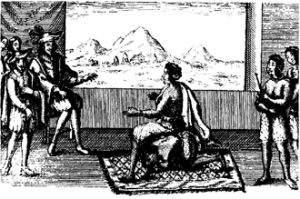
By Gabby Storey
Njinga, born c. 1582 to the royal family of Ndongo, was trained in both as a diplomat and in warfare during her adolescence. These skills came into practice many times during her reign as she resisted Portuguese colonial expansion into her kingdoms.
In 1617, Njinga’s father died and her brother Ngola Mbandi came to power. Fearful of Nzinga’s son, Ngola Mbandi had the son killed, and then Njinga forcibly sterilized. Nzinga fled to Matamba, where she resided until her brother recalled her in 1621 to act as Portuguese ambassador.
Njinga successfully ensured Ndongo’s independence and that it did not need to pay tribute, and agreed to study Christianity. She was baptised in Luanda, and took the name of Ana de Sousa in honour of her godparents.
When she became ruler of Ndongo in 1624 at the age of 42, she was the first woman to rule. Although her brother named her successor, she faced opposition due to her sex. Njinga was forced to flee, and captured the queen of Matamba and her army before taking back Ndongo.

As queen, Njinga faced many battles against Portuguese expansion, which was only resolved on 24 November 1657 when the Portuguese surrendered their claims to Ndongo. She concentrated on restoring her kingdoms after several years of warfare.
She was also focussed on the succession, however her plans for her sister to succeed were met with difficulty. Despite many assassination attempts and movements to dethrone her, Njinga died peacefully on 17 December 1663.
She is remembered for her strength in diplomacy and negotiation, as well as her role as a warrior queen.
Recommended Reading
Hettie V. Williams, “Queen Nzinga (Njinga Mbande),” in Encyclopedia of African American History, Volume I, eds., Leslie M. Alexander and Walter C. Rucker, 82-84 (Santa Barbara: ABC-CLIO, 2010)
Joseph C. Miller, “Nzinga of Matamba in a New Perspective,” The Journal of African History 16.2 (1975): 201–216
Linda Heywood, Njinga of Angola. Africa’s Warrior Queen (Cambridge, MA: Harvard University Press, 2017).
